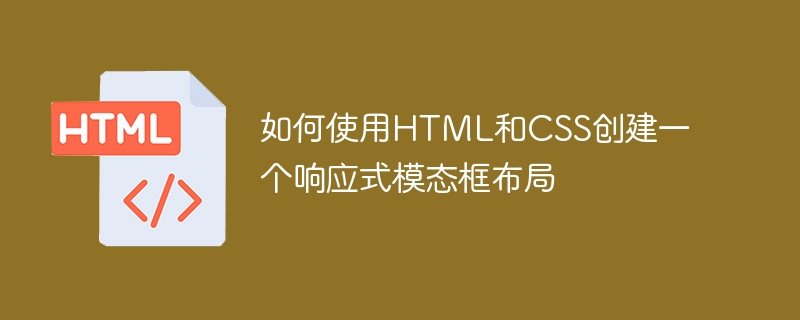

How to create a responsive modal box layout using HTML and CSS
In modern web design, the modal box (Modal Box) is a common element. Used to display additional content on the web page, such as prompts, login boxes, image displays, etc. In this article, we will learn how to create a responsive modal layout using HTML and CSS, and provide specific code examples.
First, we need to create a basic HTML structure. Here is a simple modal box example:
<!DOCTYPE html>
<html>
<head>
<title>响应式模态框布局</title>
<link rel="stylesheet" type="text/css" href="style.css">
</head>
<body>
<button id="modalBtn">打开模态框</button>
<div id="modalBox">
<div class="modalContent">
<h2>标题</h2>
<p>模态框的内容</p>
<button id="closeBtn">关闭模态框</button>
</div>
</div>
<script src="script.js"></script>
</body>
</html>In the above HTML code, we have created a button that opens the modal box through the <button> element. Next, we create a modal box container through the <div> element and define the content of the modal box in it, including a title, text content, and a close button. Note that we also set an id attribute for the modal box container for use in subsequent CSS and JavaScript code.
Next, we need to use CSS to define the style of the modal box. The following is a basic CSS style code example:
/* style.css */
#modalBox {
display: none; /* 初始状态下,模态框是隐藏的 */
position: fixed; /* 固定在屏幕上 */
top: 0;
left: 0;
width: 100%;
height: 100%;
background-color: rgba(0, 0, 0, 0.5); /* 模态框的背景颜色和不透明度 */
z-index: 999; /* 确保模态框显示在最前面 */
}
.modalContent {
background-color: #fff;
padding: 20px;
margin: 10% auto; /* 在屏幕中垂直和水平居中 */
max-width: 600px; /* 控制模态框的最大宽度 */
}
#closeBtn {
margin-top: 20px;
} In the above CSS code, we first set the display property of #modalBox to none, make it hidden in its initial state. Then, we defined some basic styles for the modal container and modal content, such as background color, padding, margins, and maximum width. These styles can be adjusted according to actual needs.
Finally, we need to use JavaScript to control the display and hiding of the modal box. The following is a simple JavaScript code example:
/ script.js
var modalBtn = document.getElementById("modalBtn");
var modalBox = document.getElementById("modalBox");
var closeBtn = document.getElementById("closeBtn");
modalBtn.addEventListener("click", function(){
modalBox.style.display = "block"; // 点击按钮时显示模态框
});
closeBtn.addEventListener("click", function(){
modalBox.style.display = "none"; // 点击关闭按钮时隐藏模态框
});Through JavaScript, we obtain the elements of the button, modal box container, and close button. When the user clicks the button, we display the modal box by modifying the display attribute of #modalBox to block. When the user clicks the close button, we reset the display property to none to hide the modal.
With the above HTML, CSS and JavaScript code examples, we can create a responsive modal box layout. You can adjust the style and layout according to actual needs to meet your specific needs. I hope this article will be helpful to your study!
The above is the detailed content of How to create a responsive modal layout using HTML and CSS. For more information, please follow other related articles on the PHP Chinese website!